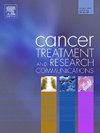基于生物信息学的研究MYD88和GRB2基因在胃癌中的表达波动及表现;它们可以被视为诊断性生物标志物吗?
IF 2.4
Q3 Medicine
引用次数: 0
摘要
胃癌(GC)是全球第四大最常见的恶性肿瘤,也是全球癌症相关死亡的第二大原因。死亡率升高与分子异质性、晚期诊断和现有治疗方法的有限疗效有关。生物信息学的最新发展促进了新的生物标志物和治疗靶点的发现,这对提高胃癌的诊断、预后和治疗方法至关重要。本研究对与胃癌进展和免疫反应调控相关的两个重要基因GRB2(生长因子受体结合蛋白2)和MYD88(髓样分化初级反应88)进行了生物信息学分析。我们分析了来自GEPIA2、TIMER、GeneMANIA和Cytoscape等公共数据库的数据,以检测胃癌组织与正常组织中GRB2和MYD88的差异表达、它们在蛋白-蛋白相互作用网络中的作用以及它们与免疫浸润的关联。研究结果表明,GRB2表达升高与肿瘤侵袭显著相关,强调了其作为胃癌独立预后标志物和治疗靶点的潜力。MYD88的表达与幽门螺杆菌感染诱导的NF-κB信号通路的激活有关,从而参与慢性炎症和肿瘤的发生。包括KEGG和GO的功能富集分析表明,这两个基因都参与了必要的致癌途径,如细胞增殖、免疫反应调节和炎症信号传导。结果表明,GRB2和MYD88可能作为患者分层的重要生物标志物,在制定胃癌靶向治疗方案时应予以考虑。本研究强调了GRB2和MYD88在胃癌进展中的重要性,并提出了它们作为提高患者预后的治疗靶点的潜力。本文章由计算机程序翻译,如有差异,请以英文原文为准。
Bioinformatic-based study to investigate the fluctuations and performance of MYD88 and GRB2 gene expression in gastric cancer; Can they be considered diagnostic biomarkers?
Gastric cancer (GC) ranks as the fourth most prevalent malignancy and constitutes the second leading cause of cancer-related mortality globally. The elevated mortality rate is linked to molecular heterogeneity, late-stage diagnosis, and the limited efficacy of existing therapies. Recent developments in bioinformatics have facilitated the discovery of new biomarkers and therapeutic targets, essential for enhancing diagnosis, prognosis, and treatment approaches in gastric cancer. This study examines the bioinformatics analysis of two significant genes, GRB2 (Growth factor receptor-bound protein 2) and MYD88 (Myeloid differentiation primary response 88), associated with gastric cancer progression and immune response regulation.
We analyzed data from public databases such as GEPIA2, TIMER, GeneMANIA, and Cytoscape to examine the differential expression of GRB2 and MYD88 in gastric cancer tissues versus normal tissues, their roles in protein-protein interaction networks, and their association with immune infiltration. The findings indicate that elevated GRB2 expression correlates significantly with tumor invasion, underscoring its potential as an independent prognostic marker and therapeutic target in gastric cancer. The expression of MYD88 is associated with the activation of the NF-κB signaling pathway, which is induced by Helicobacter pylori infection, thereby contributing to chronic inflammation and tumorigenesis.
Functional enrichment analysis, encompassing KEGG and GO, indicated that both genes are involved in essential oncogenic pathways, such as cell proliferation, immune response regulation, and inflammatory signaling. The results indicate that GRB2 and MYD88 may function as significant biomarkers for patient stratification and should be considered in the formulation of targeted therapies for gastric cancer.
This study highlights the importance of GRB2 and MYD88 in the progression of gastric cancer and proposes their potential as therapeutic targets to enhance patient outcomes.
求助全文
通过发布文献求助,成功后即可免费获取论文全文。
去求助
来源期刊

Cancer treatment and research communications
Medicine-Oncology
CiteScore
4.30
自引率
0.00%
发文量
148
审稿时长
56 days
期刊介绍:
Cancer Treatment and Research Communications is an international peer-reviewed publication dedicated to providing comprehensive basic, translational, and clinical oncology research. The journal is devoted to articles on detection, diagnosis, prevention, policy, and treatment of cancer and provides a global forum for the nurturing and development of future generations of oncology scientists. Cancer Treatment and Research Communications publishes comprehensive reviews and original studies describing various aspects of basic through clinical research of all tumor types. The journal also accepts clinical studies in oncology, with an emphasis on prospective early phase clinical trials. Specific areas of interest include basic, translational, and clinical research and mechanistic approaches; cancer biology; molecular carcinogenesis; genetics and genomics; stem cell and developmental biology; immunology; molecular and cellular oncology; systems biology; drug sensitivity and resistance; gene and antisense therapy; pathology, markers, and prognostic indicators; chemoprevention strategies; multimodality therapy; cancer policy; and integration of various approaches. Our mission is to be the premier source of relevant information through promoting excellence in research and facilitating the timely translation of that science to health care and clinical practice.
 求助内容:
求助内容: 应助结果提醒方式:
应助结果提醒方式:


